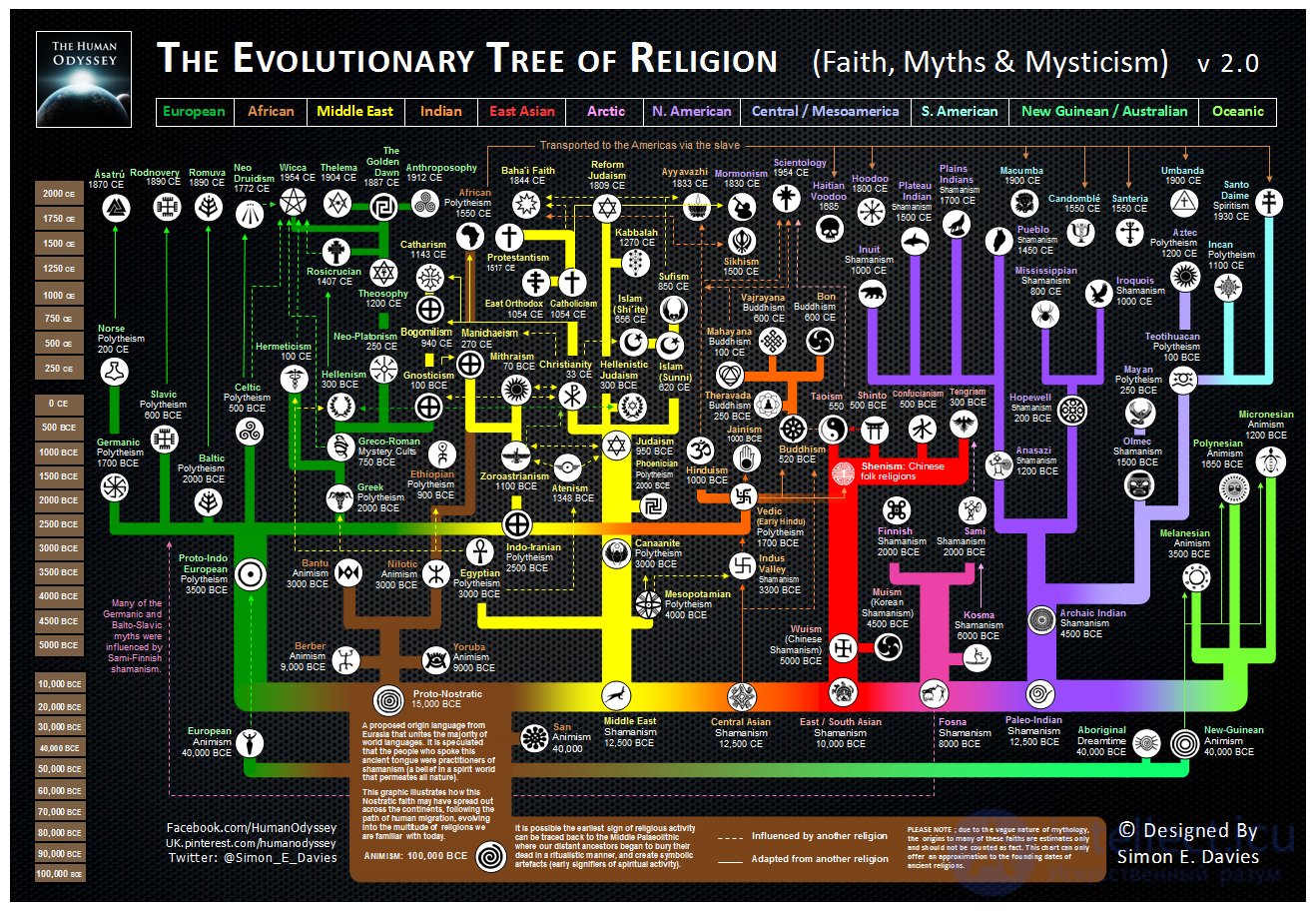Lecture
Evolutionary Tree of Religions
Since at the dawn of mankind, people tried to understand their world, especially when faced with unknown phenomena, such as “what causes storms?”, “What happens to us after death?”, And “how was the world formed?”? that from such questions our first primitive religions were formed.
The earliest evidence of religious practice can be traced back 100,000 years ago, when we began to bury our dead. Despite the fact that we cannot define it as a source of faith, it nevertheless really suggests that at the dawn of mankind, we began to consider some sort of afterlife.
Over time, this religious practice has generated a new ideology that has spread to all continents, known today as " animism ." This new belief was a belief system, the root of which will evolve and expand into numerous other ideologies around the world. The development of these religions can be divided into three classical periods.
It should be noted that these periods do not indicate a new ideology for the improvement of the old systems of faith. Like many other aspects of life, religions change over time; their rituals and customs may become more complex, some die out, and others adapt to the new social and political environment.
Period 1: Animism (100 000 BC - to present)
People began to believe that natural constructions (for example, plants, animals, stones and wind) possessed a spiritual essence. It was believed that these clergy, have the energy and temperament that influenced our everyday world. By worshiping these godlike beings, they believed that we could maintain harmony with this world of spirits and receive help (preference) from them.
Period 2: Polytheism (15000 BC - Present)
The roots of polytheism may lie in the era of epipalaleolit. Linguists and historians have identified a hypothetical linguistic family called the Nostratic, which probably influenced all African and Eurasian dialects. Many of the words that can be associated with reconstructed natural gods (for example, mother-earth and the sky of the father). This suggests that the spirits of the nature of animism has evolved into a new generation of gods (giving abstract beings of thunder and water to a more human form). During the Neolithic revolution, civilizations began to have new areas of knowledge (for example, lawmaking, metallurgy, agriculture and trade). These were the descendants of the Nostratic gods (for example, Indo-Europeans and Sumerians), who took on the role of guide and leader in the civilized world.
As a rule, these divine beings were divided into several classes, observing the sky, the world of mortals and the underworld. Each deity has its own authority, religious practice and domain (for example, trade, diplomacy, war of the courts, etc.). A person can either worship one or all of these creatures, benefiting from them with the help of sacrifice, prayer and even donations.
Period 3: Monotheism (1348 BC - Present)
In the Bronze Age, a new movement emerged that prioritized one God over all other deities. This system is known as monotheism - belief in one Supreme Being. In 1348 BC, Pharaoh Akhenaten, raised the less well-known God called "Aton", which has the highest status, with the role of all other Egyptian deities underestimated. A little later in Iran, Zarathushtra (a Persian priest) argued, "Ahura Mazda", is the only supreme deity. This new system gave the assumption that one creator god formed a known universe, and was completely self-sufficient, able to rule over all other parts. This idea began to be traced in Judaism, Christianity, Islam and Sikhism.
Most monotheistic systems tend to be exceptional in nature, which meant that the gods of the old world had to be cleared of mans consciousness. As a result, monotheistic religions display less religious tolerance than polytheistic religions, with the result being used in many wars and political disputes.

Comments
To leave a comment
Religious studies
Terms: Religious studies